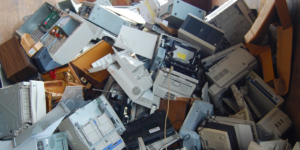As technology continues to advance at alarming rates, it is no wonder tech companies rush to release newer models on a consistent basis.
In fact, it often seems like once you buy a newly released laptop, smartphone, or tablet, the new version is set for release in the coming months.
It’s enough to make you wonder how much money you will end up spending on technology in your lifetime just trying to keep up.
When you upgrade to a new laptop, you have a few options of what to do with your old one. This is especially true if your old laptop is still in good working order.
First, you could throw it away. This is never recommended. Second, you could sell your used laptop, in exchange for cash, and use the money towards your next laptop purchase. Or, if your laptop is very old, you could recycle it.
For those that cannot sell their used laptop to companies like Gadget Salvation in return for some cold hard cash, but want to do the responsible thing with their electronic device, keep reading to find out why recycling is the best option.
Why You Must Recycle Old Laptops
You may already be saving money (and helping the environment) by using recycled toners and inks.
However, many people don’t understand the negative impact that old electronic devices are having on the Earth.
Look at some of the most compelling reasons why you should start recycling your laptop when the only other option is to simply throw it in the garbage (again, this is not recommended).
1. Reduce Pollution
You may not realize it, but e-gadgets such as laptops, smartphones, and tablets have chemicals in them that are harmful to the environment. In fact, these chemicals can harm not only nature, but people as well.
Recycling your old laptop reduces the amount of pollution we are putting into the environment. More specifically, we are preventing the pile up of e-devices that overwhelm landfills and take eons to decompose.
2. It’s Illegal
Many states are taking a proactive approach to what is now considered e-waste. E-waste includes things like outdated computer scraps and equipment, stereos, televisions, and mobile phones.
While most of these items can be refurbished or recycled, they are unfortunately finding their way to landfills all over the country (even the world) because people are either unaware of the damage they are causing, or they don’t care.
In an effort to slow the negative effects of e-waste on the environment, many regions have enacted legislation making it illegal to throw e-waste items in the garbage.
For example, places like California, New York, and Oregon are taking charge when it comes to e-waste and are banning certain items from ever being thrown out in the trash again.
And, as states begin to see the positive impact legislation like this is having, they are quickly following suit and enacting their own e-waste legislation.
So, do yourself a favor. Help reduce your carbon footprint and avoid legal trouble by recycling old electronic devices when you are done with them.
3. Protect Your Data
If anything, you should never throw out your personal electronic devices into the public trash. It is so easy for hackers to get ahold of your personal data, often stored deep within your laptop, and use it to steal your identity and use your information against you.
Even if you think you may deleted all of the sensitive data, there is still a chance that some information still exists.
By recycling your old laptop or other e-device properly, your electronics can be thoroughly erased by professionals so that if they did get into the wrong hands by chance, your personal information cannot be used against you in illegal ways.
In the end, selling your old electronic devices is always going to be the best option when it comes to upgrading to newer models.
However, if there is no way for you to sell your old device and receive cash in exchange to use towards a new e-device purchase, do the responsible thing and recycle it instead.
It is better for the environment and safer for you in the long run.








